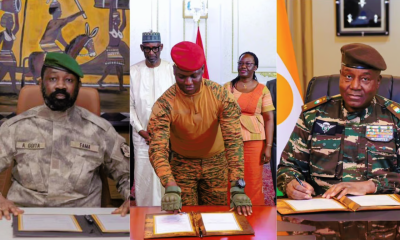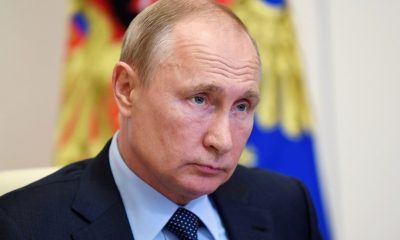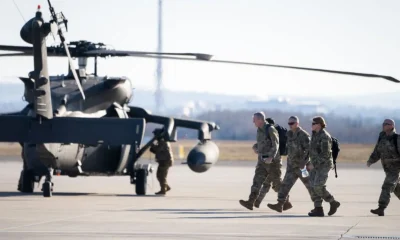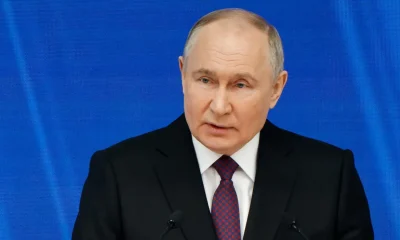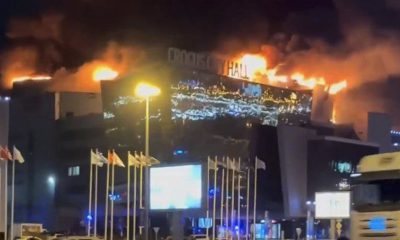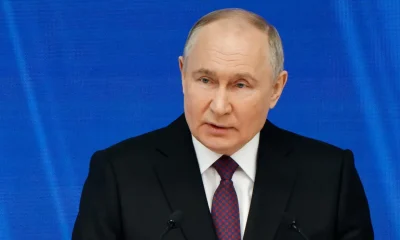
Foreign
Ukraine’s Capital Under Threat As Russia Presses Invasion

Russian troops bore down on Ukraine’s capital Friday, with gunfire and explosions resonating ever closer to the government quarter, in an invasion of a democratic country that has fueled fears of wider war in Europe and triggered worldwide efforts to make Russia stop.
Amid growing casualties from the deadly warfare — including shelling that sliced through the facade of a Kyiv apartment building, bridges and schools — the Kremlin said Russia was ready to talk with Ukrainian officials.

That came even as there were also increasing signs that Vladimir Putin’s Russia may be seeking to overthrow Ukraine’s government, in his boldest effort yet to redraw the world map and revive Moscow’s Cold War-era influence.
The U.S. and other global powers slapped ever-tougher sanctions on Russia as the invasion reverberated through the world’s economy and energy supplies, threatening to further squeeze ordinary households. U.N. officials said they were preparing for millions to flee Ukraine.
Sporting authorities sought to punish Russia on global playing fields. And NATO leaders called an urgent meeting to discuss how far they can go to challenge Putin without engaging Russian forces in direct war.

Day 2 of Russia’s Invasion of Ukraine:
Day 2 of Russia’s invasion focused on the Ukrainian capital, where Associated Press reporters heard explosions starting before dawn and gunfire was reported in several areas.
Ukrainian authorities used armored vehicles and snowplows to defend Kyiv and limit movement, and said Russian spies were seeking to infiltrate the city.
Russia’s military said it had seized a strategic airport outside Kyiv that allows it to quickly build up forces to take the capital.
It claimed to have already cut the city off from the west — the direction many of those escaping the invasion are heading in, with lines of cars snaking toward the Polish border.
Intense fire broke out on a bridge across the Dneiper River dividing the eastern and western sides of Kyiv, with about 200 Ukrainian forces establishing defensive positions and taking shelter behind their armored vehicles and later under the bridge.
Ukrainian officials reported at least 137 deaths on the Ukrainian side and claimed hundreds on the Russian one. Russian authorities released no casualty figures, and it was not possible to verify the tolls.
U.N. officials reported 25 civilian deaths, mostly from shelling and airstrikes, and said that 100,000 people were believed to have left their homes and estimated up to 4 million could flee if the fighting escalates.
Ukrainian President Volodymyr Zelenskyy pleaded with Russia’s government to hold talks, and with Western powers to act faster to cut off Russia’s economy and provide Ukraine military help.
“When bombs fall on Kyiv, it happens in Europe, not just in Ukraine,” he said. “When missiles kill our people, they kill all Europeans.”
Zelenskyy’s whereabouts were kept secret, after he told European leaders that he was No. 1 on Russia’s list of targets.
He also offered to negotiate on one of Putin’s key demands: that Ukraine declare itself neutral and abandon its ambition of joining NATO.
And the Kremlin responded that Russia was ready to send a delegation to Belarus to discuss that.
After denying for weeks he planned to invade, Putin argued that the West left him no other choice by refusing to negotiate on Russia’s security demands.
The autocratic leader hasn’t said what his ultimate plans for Ukraine are. Lavrov gave a hint, saying Friday: “We want to allow the Ukrainian people to determine its own fate.”
His spokesman Dmitry Peskov said that Russia recognizes Zelenskyy as Ukraine’s president, but wouldn’t say how long the Russian military operation could last.
Ukrainians, meanwhile, had to abruptly adjust to life under fire, after Russian forces started moving in to their country from three sides in an invasion telegraphed for weeks, as they massed an estimated 150,000 troops nearby.
In a Kyiv apartment building, residents woke to screaming, smoke and flying dust. What the mayor identified as Russian shelling tore off part of the building and ignited a fire.
“What are you doing? What is this?” resident Yurii Zhyhanov asked — a question directed at Russian forces. Like countless other Ukrainians.
He grabbed what belongings he could, took his mother, and set out to flee, car alarms wailing behind him.
Elsewhere in Kyiv, the body of a dead soldier lay on the ground near an underpass. Fragments of a downed aircraft smoked amid the brick homes of a residential area.
Black plastic was draped over body parts found beside them. And people climbed out of bomb shelters, basements and subways to face another day of upheaval.
As air raids sirens sounded in the capital early Friday, guests of a hotel in the city center were directed to a makeshift basement shelter, lined with piles of mattresses and bottles of water.
“We’re all scared and worried. We don’t know what to do then, what’s going to happen in a few days,” said one of the workers, Lucy Vashaka, 20.
Meanwhile, the mayor of the city in the rebel-controlled east said Ukrainian shelling hit a school building.
The Ukrainian military on Friday reported significant fighting near Ivankiv, about 60 kilometers (40 miles) northwest of Kyiv, as Russian forces apparently tried to advance on the capital from the north.
Russian troops also entered the city of Sumy, near the border with Russia that sits on a highway leading to Kyiv from the east.
U.S. Secretary of State Antony Blinken said Kyiv “could well be under siege” in what U.S. officials believe is a brazen attempt by Putin to install his own regime.
With social media amplifying a torrent of military claims and counter-claims, it was difficult to determine exactly what was happening on the ground.
The assault, anticipated for weeks by the U.S. and Western allies, amounts to the largest ground war in Europe since World War II.
After repeatedly denying plans to invade, the autocratic Putin launched his attack on the country, which has increasingly tilted toward the democratic West and away from Moscow’s sway.
Zelenskyy, whose grasp on power was increasingly tenuous, appealed to global leaders for even more severe sanctions than the ones imposed by Western allies and for defense assistance.
“If you don’t help us now, if you fail to offer a powerful assistance to Ukraine, tomorrow the war will knock on your door,” said the leader, who cut diplomatic ties with Moscow, declared martial law and ordered a full military mobilization that would last 90 days.
The invasion began early Thursday with a series of missile strikes on cities and military bases, and then quickly followed with a multi-pronged ground assault that rolled troops in from several areas in the east; from the southern region of Crimea, which Russia annexed in 2014; and from Belarus to the north.
After Ukrainian officials said they lost control of the decommissioned Chernobyl nuclear power plant, scene of the world’s worst nuclear disaster.
Russia said Friday it was working with the Ukrainians to secure the plant. There was no corroboration of such cooperation from the Ukrainian side.
As Western leaders rushed to condemn and punish Russia, U.S. President Joe Biden announced new sanctions that will target Russian banks, oligarchs, state-controlled companies and high-tech sectors.
SayingPutin “chose this war” and had exhibited a “sinister” view of the world in which nations take what they want by force.
He added that the measures were designed not to disrupt global energy markets. Russian oil and natural gas exports are vital energy sources for Europe.
British Prime Minister Boris Johnson announced sanctions, freezing the assets of all large Russian banks and planning to bar Russian companies and the Kremlin from raising money on British markets.
“Now we see him for what he is — a bloodstained aggressor who believes in imperial conquest,” Johnson said of Putin.
AP—Isachenkov and Litvinova reported from Moscow. Francesca Ebel, Josef Federman and Andrew Drake in Kyiv; Angela Charlton in Paris; Geir Moulson and Frank Jordans in Berlin; Raf Casert and Lorne Cook in Brussels; Nic Dumitrache in Mariupol, Ukraine, Inna Varennytsia in eastern Ukraine; and Robert Burns, Matthew Lee, Aamer Madhani, Eric Tucker, Nomaan Merchant, Ellen Knickmeyer, Zeke Miller, Chris Megerian and Darlene Superville in Washington contributed.


